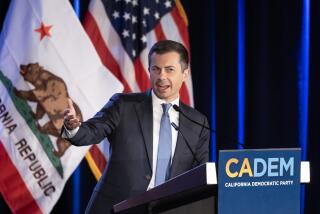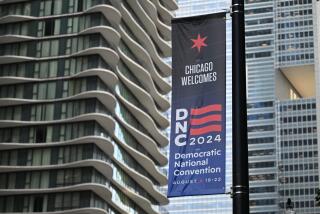Bring Back Those Smoke-Filled Rooms
- Share via
For months foreign politicians and journalists on fact-finding trips to this country have been earnestly asking American political analysts who will be the Democratic and Republican contenders for the presidency in 1988. The answer that they frequently get, because it will be the only honest response until well into next year’s primary season, is: “We don’t have the slightest idea.”
This is a bit unnerving to foreign visitors, whether they are from allied countries or the Soviet Bloc. The manner in which we respond to problems like the Third World debt to U.S. lending institutions, our huge trade deficit and the political and military competition with the Soviet Union has a major effect on other nations’ prosperity and peace of mind--and, for that matter, on their internal politics.
Thus to citizens of other lands it matters a great deal who sits in the White House. They want to think that there is an underlying wisdom to the seeming anarchy of the U.S. presidential selection process. But in fact it is increasingly doubtful that there is--a fact that should worry Americans even more than it worries foreigners.
About 15 would-be candidates already have lined up to compete for the Democratic and Republican presidential nominations, and others may sign up. It is easy to be underwhelmed by the field.
In the wake of the Iran- contra hearings a lot of pundits prophesied that this time around the American people will be looking for competence and experience.
If that proves to be the case, Vice President George Bush--with his experience in Congress, the CIA and the U.S. Embassy in China--has an advantage on the Republican side. (Whether he can overcome his reputation as a “wimp” remains a question, however.)
Among the Democratic aspirants, not one has any Washington experience beyond legislative service, and a couple don’t have even that. What they lack in big-league experience they do not make up for in charisma--all of which helps explain why they have been labeled the “seven dwarfs.”
But until they were elected President neither Jimmy Carter nor Ronald Reagan had ever had any Washington experience--or any meaningful exposure to foreign-policy problems, either. Considering the decline in the prestige of American world leadership in the last decade, that helps make the point.
In other democracies the voters decide which political party or coalition will rule, and the dominant figure in the winning party typically becomes the president or prime minister. The only role of rank-and-file voters is to choose between the contending parties--though they usually do so in full knowledge of who that party’s choice for prime minister will be.
Under that system, national leaders just don’t come out of nowhere. They have risen through party ranks and, as a generality, have had extensive exposure to foreign and domestic problems in the process.
Outside our own borders, there is nothing remotely resembling our obstacle-course presidential primary system. And it’s worth remembering that the system is not all that old here, either.
In the supposedly bad old days before “reform,” only a few states had presidential primaries. Most delegates to each party’s national nominating conventions were chosen by state conventions, which were dominated by state and local political leaders.
Some national conventional delegates were obliged to support a certain candidate for the nomination, at least on the first ballot; others were “uninstructed.”
The result frequently was a so-called open convention in which no candidate arrived with a majority of delegates in his pocket.
The choice of the candidate emerged after lengthy balloting--and a lot of horse-trading among the political bosses in the storied smoke-filled rooms.
As an exercise in democracy, the process was flawed. But it managed to produce such Presidents as Franklin D. Roosevelt, Dwight D. Eisenhower and John F. Kennedy (and, at the other end of the scale, Warren G. Harding).
Things are different now. Many states, including Iowa, have caucuses in which rank-and-file citizens participate. But the real action is in the primaries.
In 1988, 30-odd states, including nine of the 10 biggest, will hold presidential primaries that are essentially open to anybody who has the filing fee.
As a result, the vast majority of convention delegates will be chosen by popular vote. If the familiar pattern holds, the outcome will be known before the delegates ever meet; the only real purpose of the conventions will be to give the candidates a good send-off for the general-election campaign.
The direct participation of ordinary citizens in the presidential nomination process is an appealing idea.
In practice the process gives awesome power to voters in a few early states--specifically, Iowa and New Hampshire--as well as to the media and professional campaign consultants. It also puts candidates through an arduous process that has little to do with their future ability to govern.
Aspiring candidates still go through the motions of kissing babies and shaking hands at factory gates; sometimes a quick fact-finding trip to Israel or Moscow is thrown in. But in fact these are purely “media events” staged for their effect on television audiences.
Some candidates are very serious about the issues, but are convinced that the media--and probably the voters--are not. Political advertising is dominated by 20-second commercials that insult the voters’ intelligence and seem designed more to discredit the opposition than to offer a credible program.
There is a growing sense that in theory the primary system is an admirable exercise in participatory democracy--but in practice is a helluva a way to select the major-party contenders for the most powerful and difficult job in the world.
Where are those guys in the smoke-filled rooms when we need them?
More to Read
Get the L.A. Times Politics newsletter
Deeply reported insights into legislation, politics and policy from Sacramento, Washington and beyond. In your inbox three times per week.
You may occasionally receive promotional content from the Los Angeles Times.










